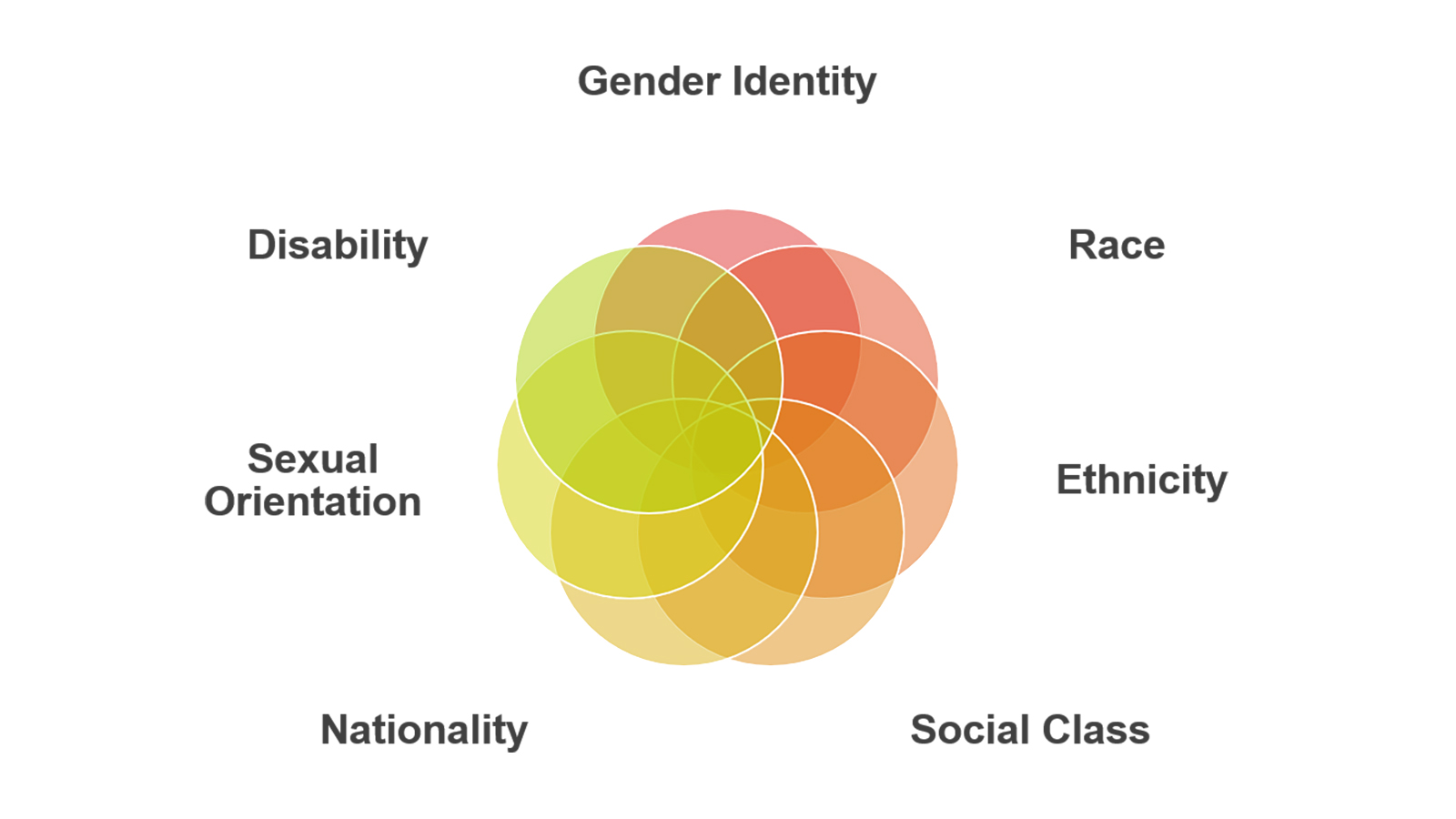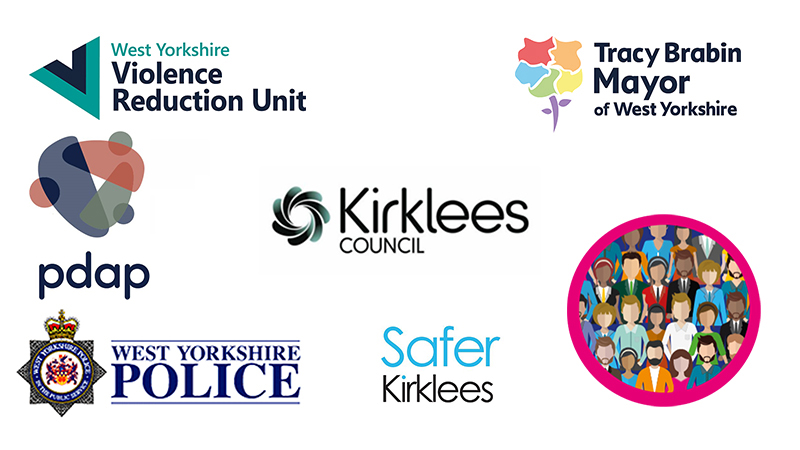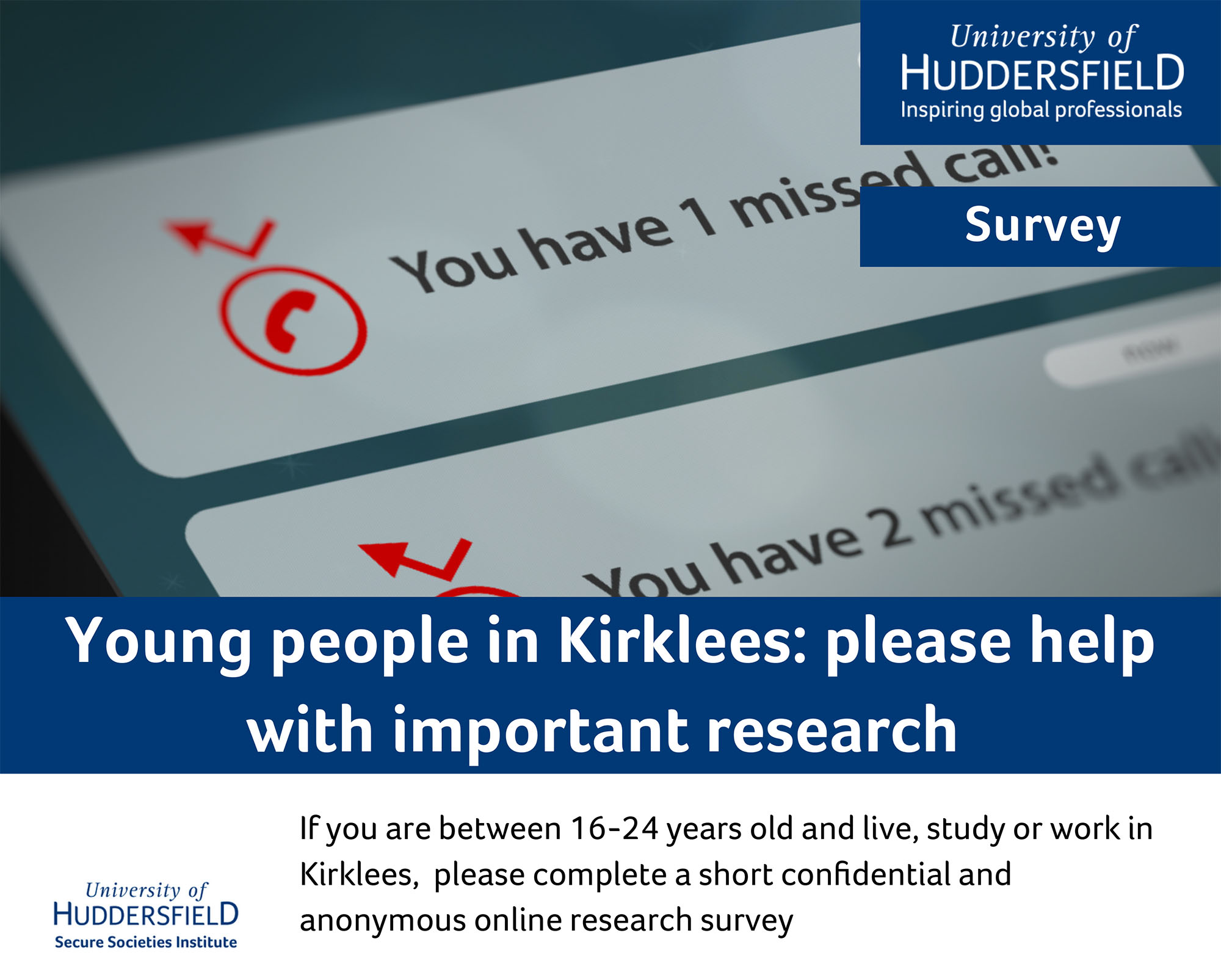
Stalking in Kirklees
Ten Years On: Stalking in Kirklees, Policing and Support for Victims
SSI researchers carried out an action research project between September 2021 and December 2023, this has contributed to changes in the policing of stalking, amplified lived experience voices and raised awareness of stalking amongst professionals in Kirklees.
Click here to download a copy of the Stalking in Kirklees Lived Experience Voices: Key Findings report

What is Stalking
Stalking is defined by the Suzy Lamplugh Trust as: A pattern of fixated and obsessive behaviour which is repeated, persistent, intrusive and causes fear of violence or engenders alarm and distress in the victim.

Research Team, Partners and Funders
The research was funded by the Economic and Social Research Council, as part of their program ‘Partner with the police to tackle violence against women’.

Research Context: Why we Developed the Project
There had been a large increase in stalking reports across West Yorkshire, including Kirklees, but convictions were low. Local practitioners were expressing concern that stalking was on the margins of policy and practice.

Project Objectives
Overall the project aimed to establish a clearer picture of stalking in Kirklees, including how West Yorkshire Police were policing stalking and identifying gaps in support for survivors.

Research Methods
The project adopted a trauma informed approach to research and was informed by the principles of participatory action research.

Stalking Hub
One aim of the project was to establish a stalking research, prevention and practice hub, as part of the Secure Societies Institute.

Multi Agency Partnership Events and Activities
Discover more about our partnerships, events and activities.

Young People in Kirklees Stalking Awareness Survey
To enhance the ESRC funded stalking in Kirklees project West Yorkshire Violence Reduction Unit funded Dr Rosie Campbell and Professor Jason Roach to carry out an online survey to collect data about young peoples understanding and awareness of stalking.

Resources & Publications
Click here for resources, publications, animations, podcasts, videos and other resources produced as part of this project.

Support Contacts
A list of contacts and services available to anyone who is experiencing stalking or has in the past.

What is Stalking?
Stalking is defined by the Suzy Lamplugh Trust as:
A pattern of fixated and obsessive behaviour which is repeated, persistent, intrusive and causes fear of violence or engenders alarm and distress in the victim.
The behaviours can be offline (such as visiting the victim’s home or place of work, following the victim or leaving gifts), or online (such as unwanted social media communication, calls, texts, emails, hacking and spyware).
For more information please visit www.suzylamplugh.org/faqs/what-is-stalking
Paladin National Stalking Advocacy Service defines stalking as:
A pattern of unwanted, fixated and obsessive behaviour, which is intrusive and causes fear of violence, or serious alarm or distress
POST (2018) note that:
Stalking and harassment both involve repeated behaviours that can cause alarm, distress or fear of violence in a victim. However, stalking is perpetrated by obsessive individuals whose behaviours disrupt a victim’s life and may escalate to other crimes.
Stalking is increasingly digitally facilitated, with perpetrators using digital technology, often referred to as cyberstalking. Stalking can be entirely online or have a digital element. This is increasingly recognised in research and online stalking cases are increasingly featured in the media (click here for an example).
Stalking Behaviours
Stalking victims are varied and many forms of behaviour have been identified as stalking behaviours, the National Stalking Helpline data base has 27 stalking behaviours (White et al 2022) that can be selected when creating records for reports made by victims/survivors. These include: watching; spying; loitering; phone calls; emails; text messages; letters; following; social networking sites (contact via social media); visit house/work; in/through workplace; gifts; third-party contact; vexatious complaints; threats; revenge porn; harassment; hacking technology; tracking device; threaten suicide; break-in; criminal damage; physical assault; sexual assault; death threats; stalking behaviours unclear; and other. This highlights how variable the experience of stalking can be.

Funder and Timescale
The research was funded by the Economic and Social Research Council, as part of their program ‘Partner with the police to tackle violence against women’.
The project commenced in early September 2022 and was completed in early December 2023.
Research Team, Partners and Funders
Dr Rosie Campbell OBE, Senior Research Fellow, was the Principal Investigator on the project “Ten Years On: Stalking in Kirklees policing and support for victims”, bringing her experience of action research around violence against women and service development for women from marginalised communities. She worked with Co-investigator Professor Jason Roach, who bought his expertise in policing.
Megan Bennett, Evaluations and Research Officer from West Yorkshire Violence Reduction Unit was seconded on a part time basis to work on the project. Dr Kate Wood, University of Huddersfield, was also be involved in the project on a part time basis.
The project was developed with a range of partners who continued to be involved throughout the project, these were West Yorkshire Police, West Yorkshire Violence Reduction Partnership (West Yorkshire Combined Mayoral Authority), Safer Kirklees and Pennine Domestic Abuse Partnership. Connect Housing. Kirklees Domestic Abuse Community Engagement Team KDACET (Kirklees Council) became active partners in the project as did Victim Support West Yorkshire.
The support we have from all our partners has been essential, invaluable and much appreciated.
There were many more organisations who supported us in a wide range of ways. We thank you all! The support we have from all our partners is essential, invaluable and much appreciated.
When the project was launched Professor Jason Roach, Director, stated that:
We developed the project application with key partners, West Yorkshire Combined Authority (Violence Reduction Partnership), Pennine Domestic Abuse Partnership, West Yorkshire Police and Safer Kirklees. Partnership has been central to the project and other organisation got involved with the project, especially via the Stalking Research and Knowledge Hub that we established within the Secure Societies Institute. Whilst our geographical focus for the project has been Kirklees, the learning from our project is being shared across West Yorkshire and beyond.
The project was developed with a range of partners who will continue to be involved throughout the project, these are West Yorkshire Police, West Yorkshire Violence Reduction Unit (West Yorkshire Combined Mayoral Authority), Safer Kirklees and Pennine Domestic Abuse Partnership.
Research Context
Stalking is a crime. Specific stalking offences were introduced into law in England and Wales in 2012 as amendments to the Protection from Harassment Act 1997. Research had identified a whole range of negative effects on stalking victims' psychological and physical health and has established a link to domestic murder (Monckton-Smith, et al 2017), making prevention and early intervention particularly important. Findings reported from national studies showed an increase in stalking reports during the pandemic (ONS 2021, Suzy Lamplugh Trust 2021). Stalking is included in the governments national strategy on violence against women and girls (Home Office 2021).
It was estimated that in the year ending March 2020, there were 1.5m victims of stalking in England and Wales (ONS British Crime Survey 2020). Stalking is a crime which is under reported to the police. There had been a large increase in reports of stalking across West Yorkshire in two years prior to the project, including in the Kirklees district, but convictions for stalking offences were low. There had been no recent research on stalking in West Yorkshire nor has there been any specialist support provision for victims. The project will bring the issue of stalking from the margins to the centre in policy and practice addressing violence against women and girls in Kirklees.
Stalking is often domestic violence and abuse related. In the year ending 2021, 36% of all stalking and harassment offences recorded by the police in England and Wales were domestic abuse-related (ONS, 2022) and research has highlighted that stalking is a high risk factor in domestic homicide (Monckton-Smith et al 2017), with 75% of victims having reported stalking or harassment previously. Yet offenders can also be strangers or acquaintances.
Although stalking is a gendered crime (the majority of victims are women and the majority of perpetrators are men) it is important to recognise that people of all genders can be victims/survivors of stalking. Stalking can be domestic violence and abuse related i.e. with offenders being current or former intimate partners, but it can also involve offenders who are acquaintances or strangers. Most stalking cases now have a digital element or are entirely online stalking. This is increasingly recognised in research. Online stalking cases are increasingly featured in the media e.g. https://www.yorkshireeveningpost.co.uk/news/crime/woman-reveals-how-internet-stalker-made-her-life-hell-offences-reported-west-yorkshire-police-rocket-59-cent-633511.
Consulting local organisations about violence against women and girls issues requires research focus. West Yorkshire Violence Reduction Unit (WYVRU 2022) identified a gap in research on stalking in West Yorkshire. Local organisations expressed concern about the rise in reports of stalking and the lack of specialist stalking support for women in Kirklees who had or were experiencing stalking. They also expressed concern that stalking was peripheral in VAWG policy and practice, and about the potential for stalking to result in serious harm. For these reasons this project was developed to bring the issue of stalking from the margins to the centre in policy and practice addressing violence against women and girls in Kirklees.
Ten years on from the introduction of stalking offences into the law in England and Wales it was felt to be a timely juncture to examine the policing of stalking and the support available for survivors.
CEO Kathryn Hinchliff, Pennine Domestic Abuse Partnership said:
PDAP has been really pleased to take part in this important project to improve the response to stalking in Kirklees. Victims of domestic abuse will often experience stalking both during the relationship and once it has ended and this can have a devastating and lasting impact on victims such as increasing isolation and anxiety, financial problems and in extreme cases resulting in severe harm and homicide. We welcomed the opportunity to work with the research team and local agency partners to improve support for victims of stalking and ensure perpetrators are held to account.
Project Objectives
Overall the project aimed to establish a clearer picture of stalking in Kirklees, including how West Yorkshire Police were currently policing stalking, and identify gaps in support for survivors, so they can get the protection and support they need, as early as possible to ensure their safety and reduce trauma.
The project specifically aimed to:
- Set up a stalking research, prevention and practice hub linked to the Secure Societies Institute to act as a forum through which practice and academic learning from the project will be shared across Kirklees, West Yorkshire and beyond.
- Review West Yorkshire police data on stalking.
- Identify current support for victims of stalking in Kirklees and review best practice for stalking victims/survivors.
- Consult women who have been survivors/victims of stalking about their experiences of support and policing, and get their views on improving support and criminal justice responses.
The studies principal investigator Dr Rosie Campbell stated:
Across West Yorkshire there is a lot of work going on to better prevent violence against women and girls and provide improved support for victims/survivors. This action research project has been part of this wider work and we hope it can contribute specifically to stalking prevention and the improvement of policing and specialist support for survivors. It has been really important to me that we have, throughout the project, worked with people with lived experience of stalking, to inform the project and its outcomes. We are proud that the project has amplified the voices of women with lived experience of stalking and that a voices and advocacy group continues to meet beyond the project. We have valued the advice, support and time given by all members of the Kirklees Stalking Research, Prevention and Practice Hub throughout the project and are pleased this will continues as a multi agency body, keeping a focus on stalking into 2024.
Stalking Research, Prevention and Practice Hub
One aim of the project was to establish a stalking research, prevention and practice hub, as part of the Secure Societies Institute. This is intended to facilitate the expansion of partnership working and to disseminate research findings and best practice knowledge about stalking initially focused on Kirklees. The Hub will continue to provide a forum for all partnership knowledge and working practices to be shared and accessed in one place.
The Stalking Research Prevention and Practice Hub met for the first time in October 2022 and continues to meet beyond the project. It has representatives from the following:
Pennine Domestic Abuse Partnership
Kirklees Domestic Abuse Community Engagement Team
The Women’s Centre Kirklees
Connect Housing
Victim Support (ISAC service)
West Yorkshire Police (Kirklees District)
West Yorkshire Police (Stalking Coordination Unit)
Change Grow Live
Kirklees Rape and Sexual Assault Centre
West Yorkshire Violence Reduction Partnership
Student Support Services (University of Huddersfield)
Students Union (University of Huddersfield)
Hear our Voices: Lived Experience Advocacy Group
Fresh Futures
If you are an organisation or community group who would like to get involved please contact the Chair of the hub Dr Rosie Campbell at r.campbell@huds.ac.uk.
We want to complement and further raise awareness in West Yorkshire, about the work and resources offered by organisations nationally raising awareness about stalking and encouraging best practice. For example;
The Suzy Lamplugh Trust who deliver the national stalking helpline.
The Paladin Trust, national stalking advocacy service, who’s mission is ‘to have a society intolerant of stalking. A society where the victim gets the right response at the right time enabling them to live safely, free from stalking. A society that holds perpetrators accountable for their behaviour’.
Alice Ruggles Trust, which aims to raise awareness of stalking (including coercive control), to ensure that relevant legislation is effective and adhered to, and to bring about lasting improvements in the management of perpetrators and the protection of victims. They offer a range of training and resources about stalking.
If you are interested in getting involved in the hub contact r.campbell@huds.ac.uk
We will update on hub developments here.
Research Methods
We used the following methods:
- Scoping current specialist support for stalking survivors/victims in Kirklees.
- Reviewing international research and practice literature on stalking, including best practice for support and policing.
- Semi structured interviews with women with lived experience of stalking to capture their experiences of stalking, policing and support, seeking their views about improving support and policing.
- Established a lived experience “influencers group” who advised on the research; helped with the design of research tools; were involved in analysis of findings, the design of consultation and findings share events. This was developed working closely with Pennine Domestic Abuse Partnership and an expanded peer led advocacy and voices group continues to meet during 2024.
- Semi structured interviews with police officers.
- Analysed West Yorkshire police stalking data.

The project adopted a trauma informed approach to research and was informed by the principles of participatory action research.
Intersectionality
We adopt an intersectional approach to stalking recognising that the experiences of stalking, policing and support will be different for various communities shaped by intersectional structural inequalities.
As this project was funded under the ESRC ‘Working with the police to tackle violence against women and girls’, program our project was focused on the experiences of women. In doing so we did not intend to minimise or erase the experiences of men and people of other gender identities.
Support Contacts
If you are experiencing stalking, or have in the past, and want to access support or information contact:
Pennine Domestic Abuse Partnership: on their 24 hour free helpline 0800 052 7222
West Yorkshire Independent Stalking Advocacy Service (West Yorkshire Victim Support): call 03003 730978 or email WY_ISAC_Service@victimsupport.org.uk or contact the charity’s national 24/7 support line on 08 08 16 89 111.
National Stalking Helpline: call on 0808 802 0300 during opening hours (Weekdays 9.30-16.00 (till 20.00 on Wednesdays).
The Suzy Lamplugh Trust who run the help line have a lot of info about Stalking on their website. https://www.suzylamplugh.org/pages/category/national-stalking-helpline

Young People in Kirklees: Stalking Awareness Survey
To enhance the ESRC funded Stalking in Kirklees Project, West Yorkshire Violence Reduction Unit funded Dr Rosie Campbell and Professor Jason Roach to carry out an online survey to collect data about young people's understanding and awareness of stalking.
The survey was co-designed with input from young people in Kirklees. Special thanks to young people from Connect Housing, The Brunswick Centre and the Huddersfield University Students Union for their advice and feedback.
Four hundred and twenty five young people took part in the confidential survey and 280 young people age 16-24 who live, work or study in Kirklees fully completed the survey.
- 73.2% of participants identified women to be more likely as victims of stalking, 23.6% identified that both males and females are equally likely, and 3.3% identified males as the most likely to be a victim.
- If a stalking behaviour was committed by a partner, in general, this was deemed to be more acceptable than a stranger or an ex-partner.
- When presented with 4 scenarios, younger people perceived using geolocation apps and sending unwanted texts as more acceptable behaviours than older participants.
- 92% of respondents were not aware of any services providing support to young people in Kirklees who are victims/survivors of stalking. Illustrating the need to raise awareness amongst young people in Kirklees about support options.
It is hoped that the findings will be used to inform a stalking prevention and awareness campaign targeted at young people